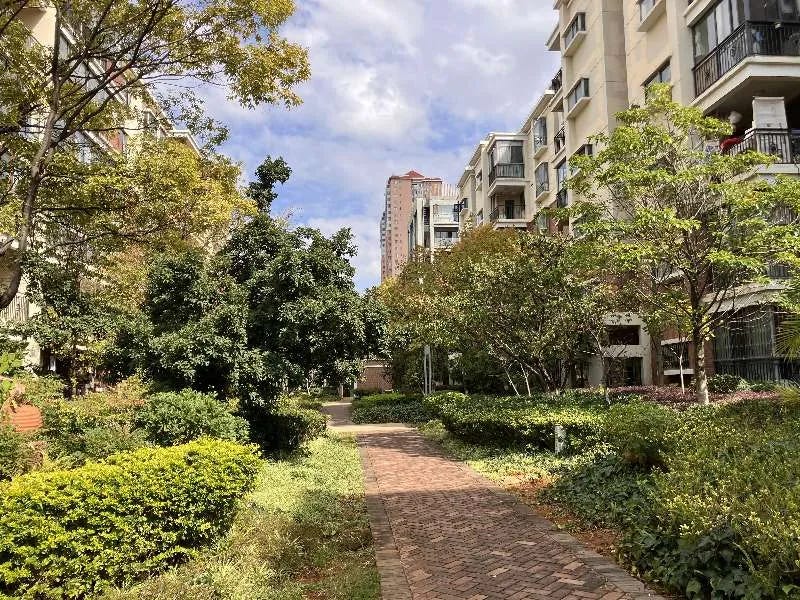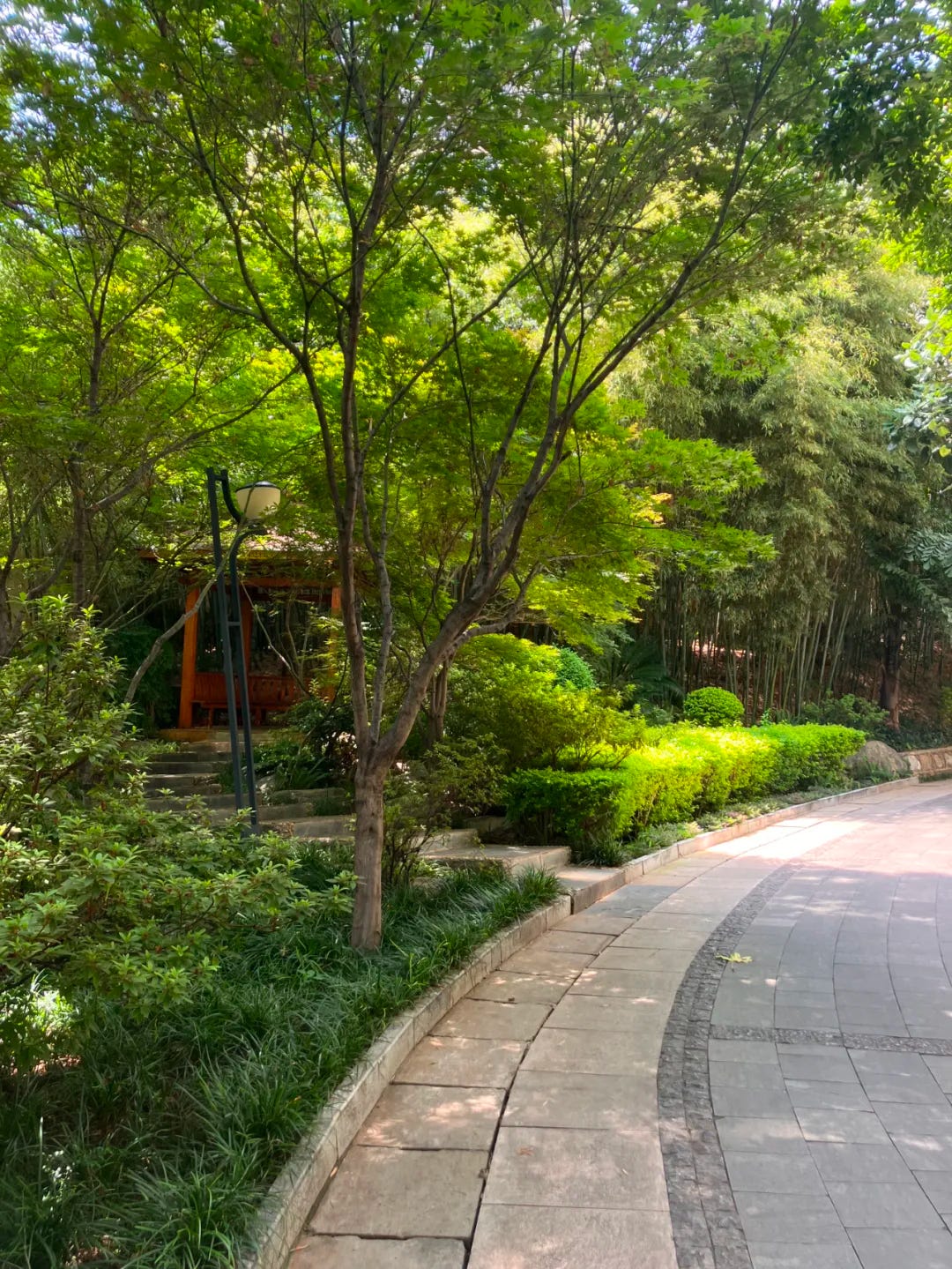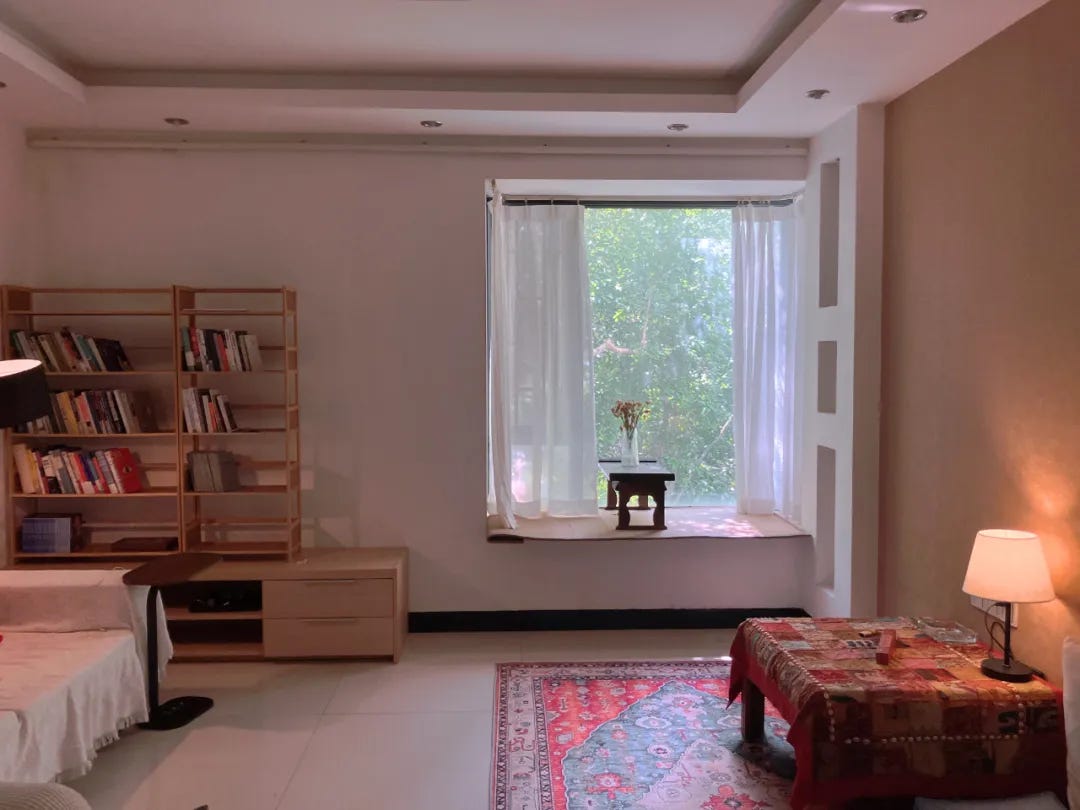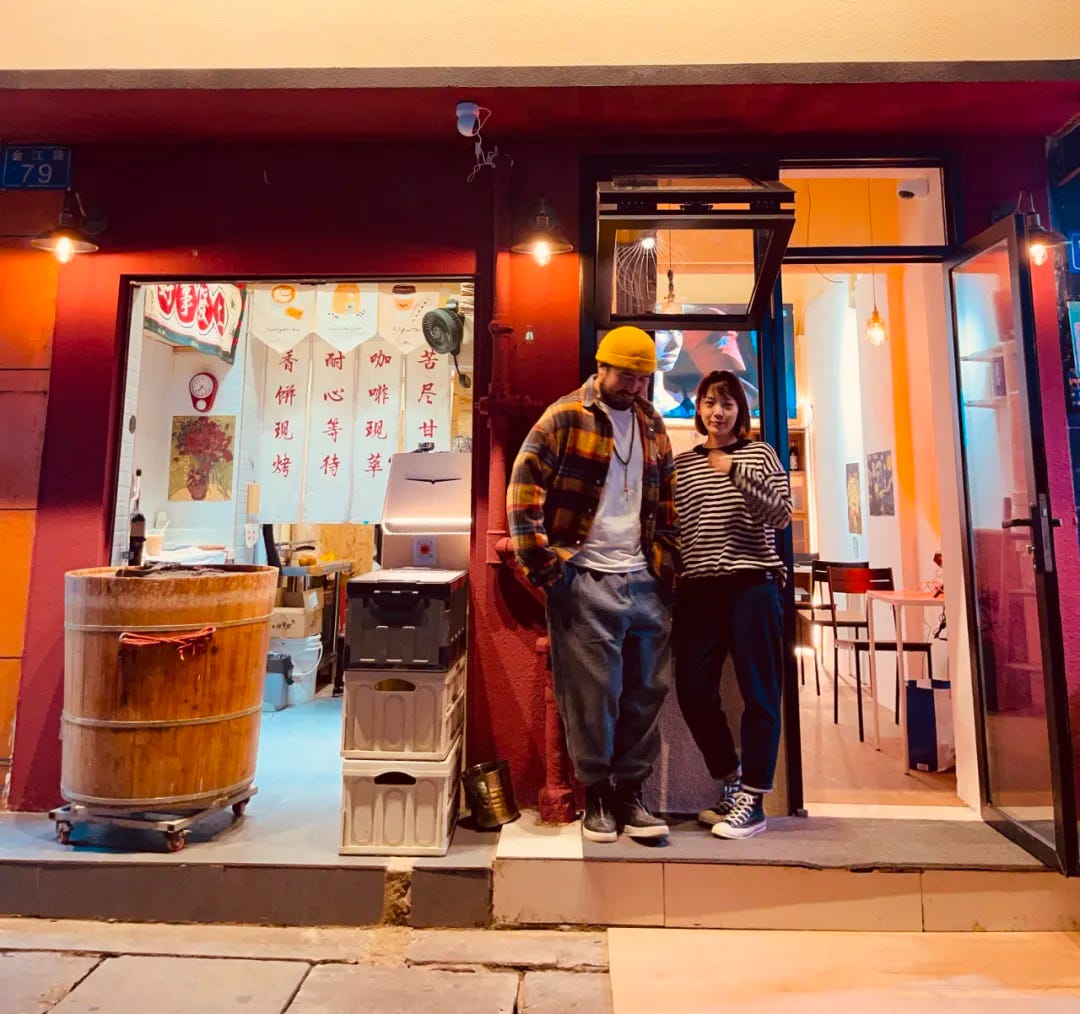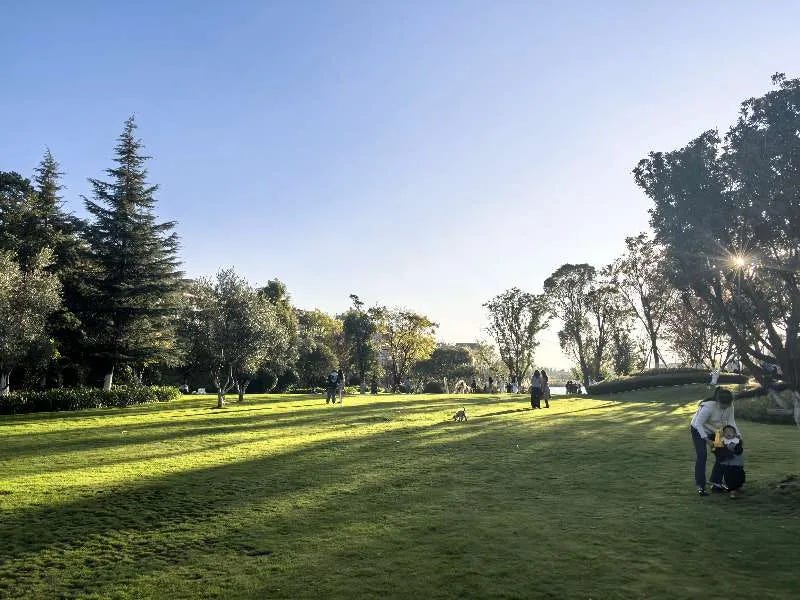Personal narratives of disillusioned Chinese people settling in Kunming
An emerging form of migration in China that you may never have heard of
Last week, I met a taxi driver (a male aged 40-50) from Kunming (the capital of Yunnan Province in Southwest China), who had moved to Shanghai just two weeks ago, seeking to improve his life. His complaints about the city were endless: the suffocating crowds, the palpable anxiety among the people, the biting cold, and the stark contrast between his tiny room in Shanghai and his spacious 130 square-meter home in Kunming. He spoke of the loneliness of leaving his family behind and the imbalance of power against drivers by companies and ride-hailing platforms. Most crucially, he wasn't earning more than what he made back in Kunming, and he felt trapped in Shanghai due to the substantial deposit he had already paid to the company for renting the car.
Over a year ago, we noted that the gig economy in China was no longer a fallback for the temporarily unemployed or those seeking to earn extra income. The landscape has shifted as industries face an oversupply of talent. This predicament is now shared by a broader demographic. When the driver inquired about the monthly earnings of a fresh graduate in Shanghai, I estimated around 10,000 yuan. He displayed a look of disdain, remarking that such a sum was hardly worth the effort; one could earn a comparable amount in Kunming. Considering the high youth unemployment rate, sluggish consumption in top-tier cities, and declining property values, as a lifelong resident of Shanghai, I found myself with little argument to counter his perspective.
Top-tier cities are losing their once-unassailable allure for talent.
Around a year ago, Amber from our team journeyed to Dali in Yunnan province and penned an article about her unique experiences (Understanding Today's Chinese Youth by Exploring China's 'Utopia City'). In her article, she detailed her firsthand encounters with local traditions and their commercialization, as well as the growth of the service industry in Dali.
Dali is likely the quintessential haven for China's literary and artistic youth, who cherish a lifestyle steeped in naturalism, music, and poetry. In today's article, we provide an updated perspective on the current state of affairs, from the perspective of a firsthand witness. With an influx of newcomers to Dali, the cost of living and rent have surged significantly, prompting many residents to relocate to Kunming, the capital city in Yunnan province. They seek for the balance of affordability and the amenities of urban living, as well as good living conditions, characterized by closeness to nature and a more leisurely pace of life.
Those people in the article remind me of another astonishing story I learned from the driver, which was about his own downward social mobility. Years ago, he sold two properties and took out a loan of 2 million yuan to invest in a copper mine. However, due to government environmental policies, the mine was shut down, and all his investments were lost. As he reached this point in the story, we had arrived at my destination. I wanted to ask more, but I had to get out of the car. Before I left, I heard him say, "Who would do this kind of work at this age if they didn't have to?" It was as if he was talking to himself.
I felt a sense of desolation. I imagined that when he made the investment, he must have been full of vigor and hope for wealth and social advancement, just like all of us who strive to keep up with the tide of the times. The tide of the past thirty years has been so immense that those caught in it were unaware; and when it receded swiftly, those who were left behind are still searching for a way out. This is true for those enjoying the romantic scenery of Dali, for those in Kunming dealing with their children's school transfers and opening shops, and for those in first-tier cities gazing up at the city lights at night. In this era of great change, no one can have a once-and-for-all answer.
Below is our translation of the full article, with some paragraphs abbreviated or modified by Baiguan. Continue reading to learn how people from other regions in China continue to migrate within the provinces of Yunnan.
Kunming is now the hotspot for those seeking a long-term haven, just as Dali was a decade ago. It's drawing digital nomads from Yunnan and middle-class families fleeing the high costs and smog of top-tier cities, all in pursuit of a better life balance.
For years, "leaving Beijing, Shanghai, and Guangzhou for Dali" was a common escape. But by 2024, Dali's allure faded as Kunming emerged as the new choice for those like me, who've made the move from Dali. Kunming's allure was confirmed by a "livability survey" conducted by travel influencer Tao Xiaxia, whose followers from Shanghai overwhelmingly chose Kunming as their top destination.
Social media is abuzz with envy and admiration for "Life in Kunming," where people are tired of the rat race and yearn for a city with sunshine, affordability, and a relaxed pace. I've met lawyers, tech workers, and finance pros, all around 30, who are burnt out from the cutthroat competition in first-tier cities and are now starting anew in Kunming.
Unlike Dali's picturesque allure, Kunming offers a practical balance. It's where the worn-out say, "I can't keep up with the grind," and find a slower, more intentional life. Kunming is the new meeting point for those tired of Dali's retreat and the city's hustle, all seeking a balanced and fulfilling lifestyle.
Leaving Dali for Kunming
Ning Ning took only four days to move from Dali to Kunming.
The tipping point was her landlord’s decision to raise the rent on her three-bedroom apartment at the foot of the Cangshan Mountains from RMB 1,500 to 2,300 while putting the property up for sale. It was the cheapest and most convenient fully independent apartment she could find in Dali’s Old Town. Otherwise, her only option would be to move to Xiaguan Town, a more urbanized area 20 minutes away by car—a compromise she wasn’t willing to make.
But then she thought, if she had to move to Xiaguan, why not go all the way to Kunming? After all, many long-term Dali residents had already relocated to Kunming over the past year or two, including her friend Shi Yan. He had settled in Kunming’s Chenggong District, attracted by its better housing conditions, tranquil living environment, and low rent—hard to resist for anyone.
As an independent publisher, Ning Ning often needed to travel to cities like Beijing to meet authors, which required taking a high-speed train to Kunming for connecting flights—a significant cost in both time and money. This made the decision easier: she would move to Kunming.
It only took her one day to find an apartment in Chenggong. She viewed three properties and quickly settled on a two-bedroom unit in a neighboring complex to Shi Yan’s, located in the southern part of Chenggong, right next to a subway station. Including agent and management fees, the rent was just RMB 1,200 per month (Baiguan Note: The average rent for a two-bedroom apartment in Shanghai and Beijing is roughly between 3,000 yuan/month and 10,000 yuan/month, depending on the location and housing quality).
After returning to Dali, Ning Ning spent three days packing for her move. Her largest item was a bed that originally belonged to her previous landlord. She found it so comfortable that she bought it for RMB 200. Along with a refrigerator, washing machine, sofa, bookshelf, clothing, household items, cookware, and over 200 books, she loaded everything onto a moving truck bound for Kunming. The transport cost RMB 2,000. Six hours later, Ning Ning arrived in Kunming, marking the end of her four-year stay in Dali.
Ning Ning’s story is far from unique. Over the past three to four years, Dali has gained immense popularity. The city remained largely unaffected by the pandemic and offered a unique coolness during China’s scorching summers, alongside its breathtaking views of Cangshan Mountain and Erhai Lake and its idyllic, pastoral lifestyle. These qualities made Dali a magnet for middle-class escapees from first-tier cities, digital nomads, and young professionals who quit their jobs in search of a different pace of life. The hit TV series "去有风的地方" Meet Yourself, starring Liu Yifei, only amplified Dali’s fame as a social media hotspot.
The surge in popularity turned Dali’s homestay and hotel market into a frenzy, with rooms often fully booked and prices soaring. This trend extended even to the traditional off-seasons of March, April, November, and December. Rental prices also climbed steeply. In premium areas like Shanshuijian and Dali’s Little Courtyard, a two-bedroom apartment that once cost RMB 3,000 to 4,000 per month before 2020 skyrocketed to over RMB 5,000 in the three years that followed. Short-term rentals for one or two months now range from RMB 7,000 to 10,000. Even in older residential areas or privately built village homes, rents have risen by RMB 800 to 1,000.
The old neighborhood where Ning Ning lived had long maintained an annual rent of just over RMB 10,000, attracting locals and long-term residents from outside Dali. However, in the past two years, even these homes began to be converted into short-term rentals for tourists, with annual rents rising to RMB 20,000 or 30,000.

Many digital nomads left Dali for Kunming due to rising rents and transportation challenges. Meanwhile, parents like Shi Yan, who had settled in Dali for years, relocated primarily for their children’s education. While Dali boasts innovative schools, these are mostly limited to kindergarten and the early years of primary school. As children approach higher grades, families often face tough decisions about their next steps. Moving to Kunming, which offers better educational resources without leaving Yunnan, has become a common solution.
Shi Yan moved to Kunming with his daughter last fall, enrolling her in a local international school for fifth grade. By this year, five of her classmates from Dali had also transferred to the same school in Kunming. Among the remaining 10 or so students in her Dali class, nearly half were planning to follow suit, reuniting with their peers in Kunming.
Before moving to Kunming, I, too, had lived in Dali for five years. I made a modest living writing for media outlets and freelance platforms. Work didn’t consume much of my time, leaving me free to read, wander through the forests and streams of Cangshan, or meet friends for leisurely meals and conversations. I rented the top floor of a local village house, where the rooftop terrace offered views of Cangshan Mountain and Erhai Lake. It was an idyllic, pastoral existence.
But after five years, I decided it was time to leave. Dali, at its core, is a rural, fifth-tier town with a slow pace of life. Many residents begin their days in the early afternoon. Even my routine—waking at eight or nine in the morning and working occasionally for eight hours a day—earned me the reputation of being among the most diligent in Dali.
Over time, even someone as "diligent" as me couldn’t escape the creeping lethargy. Days felt long and drowsy, and life seemed to drift by, leaving me to age slowly but imperceptibly. This wasn’t the life I envisioned for myself in my 30s, at the peak of my energy and potential.
I decided to return to a city—not as fast-paced as China’s first-tier metropolises but also not as languid as Dali. Being from Sichuan, I chose Chengdu. Over two years there, I found a rhythm that suited me: not too busy, not too idle. Life felt vibrant but not exhausting, and my social life, work opportunities, and income all improved.
However, Chengdu had one major drawback for me: the lack of sunshine. Summers were unbearably hot, while autumn and winter were gloomy and smoggy—an emotional drain for someone whose mood is easily affected by the weather. During frequent business trips or vacations to Kunming, I would stroll through the sunlit streets of Cuihu Lake, Wenlin Street, and Qianju Street, and the thought of living in Kunming began to take root. Like Chengdu, Kunming is a moderately sized city, but with the added benefits of good weather and abundant sunshine—a rare combination of urban vitality, natural beauty, and bright skies.
So, one day at the end of March, I packed two suitcases and boarded a flight to Kunming, ready for a new chapter.
New landmarks for escaping from metropolises
After arriving in Kunming, I felt like I had returned to another home—my "Yunnan hometown." I rented a three-bedroom apartment near Cuihu Lake for RMB 1,800 a month in a complex that feels like a forest, surrounded by bamboo, banana trees, magnolias, maples, and osmanthus. Outside my window, there were no smoggy skies, only the brilliant sunshine of the plateau, with the wind gently swaying the trees.
Kunming’s nickname as the "City of Eternal Spring with Flying Flowers" lives up to its reputation. Shortly after settling in, I witnessed the blooming of jacaranda trees that turned streets like Jiaochangzhong Road and Lianmeng Road into a dreamy purple landscape. Passersby—on foot, in cars, or riding bikes—paused to admire the blossoms, their faces soft with serenity. In those moments, it’s impossible not to feel the brightness and happiness unique to living in Kunming.
As local writer Yu Jian once described Kunming, "What she offers to the world is her simple and unpretentious sunshine, blue skies, clouds, flowers, air, spring, land, and a life that nourishes the soul—a wake-up call for a civilized world numbed to the essence of dwelling."
I began to meet more and more people who had either moved to Kunming or were planning to. Many were from first-tier cities, and in conversations, I realized they represented an evolution of the "Escape to Dali" phenomenon, only now with Kunming as the destination.
Take Gao Wanguan and his wife, for example. In their early 30s, they quit their jobs in Beijing last August after seven years of relentless work and moved to Kunming to "lie flat." And they truly embraced it—they stopped working, earning, and networking. Their days became a slow rhythm of strolling through parks, watching the trees and clouds, admiring sunsets, shopping for groceries, cooking, eating, reading, and watching shows.
They avoided Dali because, as they put it, "Dali is too much of a social media hotspot." They dislike overly popular places. During their years in Beijing, they never visited the Forbidden City or climbed the Great Wall but frequently went to quieter spots like Jingshan Park and Chaoyang Park.
Kunming appealed to them because of its mild and dry climate. Gao’s wife is prone to sweating, even during Beijing’s spring and autumn, making summer unbearable. A place with "eternal spring" was their consensus, and Kunming turned out to be the ideal choice.
Then there’s Su Qing, a lawyer who relocated to Kunming with her family in June. A friend of hers had moved to Dali years ago and started a family there, but Su Qing never considered following suit. Her work in finance and IPO law wouldn’t allow for a career switch, and moving to Dali would have been akin to unemployment.
Kunming, however, offered her the chance to continue her career. Earlier this year, she was given the opportunity to build a team and expand her business in Kunming, prompting her to move her entire family. Her two children enrolled in a private elementary school and kindergarten in Kunming.
For middle-class families managing the added challenge of relocating with their entire household, Kunming is a place that’s not only accessible but also livable and sustainable in the long term.
Even for Dali families, Kunming is often the natural next step. Dali’s innovative schools shine in kindergarten and early primary education, but once children reach fourth or fifth grade, parents must decide what’s next. The options typically include returning to public schools in their hometown, studying abroad (often in Chiang Mai or Malta), enrolling in international schools in Hainan, or moving to Kunming.
For Shi Yan and his wife, public school was not an option for their daughter. Children from innovative schools often struggle to compete academically with public school students, which could create immense pressure.
Considering both sets of parents and their respective careers, Shi Yan and his wife also dismissed the idea of going abroad. While they explored alternatives, including international schools in Hainan, their daughter failed the entrance exams. Others, like Zheng Xiaohong, were deterred by Hainan’s sweltering 40-degree summers. Staying in Yunnan became a balanced choice that allowed them to preserve their lifestyle without compromising their child’s education.
After thorough research, Shi Yan’s family settled on an international school in Kunming, which seamlessly aligned with their daughter’s education in Dali while offering a more structured curriculum. The school welcomed several children from Dali’s innovative schools, noting their shared traits of independence, curiosity, and emotional stability—qualities the school found highly desirable.
Although the tuition fees for Kunming’s international schools are steep, averaging RMB 100,000 annually, they’re significantly lower than fees in first-tier cities. Many families adopt a split arrangement: one parent lives in Kunming with the children, while the other stays in a first-tier city to work and cover expenses. For Dali families, moving to Kunming strikes the best balance between education and quality of life.
Kunming as a city born for everyday living
In Yunnan, locals affectionately call themselves "hometown lovers", a phrase that reflects their deep attachment to their homeland. As long as life is manageable, they see no reason to leave—and the same goes for many travelers who settle here. Initially, many are captivated by Yunnan’s ethereal skies and clouds, finding solace and healing in its natural beauty. Shen Congwen, a renowned writer who once taught at the National Southwest Associated University in Kunming, captured this perfectly: "The clouds in Yunnan seem to be crafted from the snowy peaks of Tibet and the warm winds of the South China Sea—astonishing in their simplicity, yet profound in their greatness."
What keeps people here, however, is not just the scenery but also the city’s unhurried rhythm and its everyday charm. Author Yu Jian described Kunming in his book Notes on Kunming as "a city born for everyday living." He wrote about its residents whose lives revolve around "basking in the sun, drinking tea, and chatting idly." In this remarkably slow city, people have the time to refine their lives to perfection, unconcerned with the frenzied train of modernity. Lazy, deliberate, and unhurried—a place where life quietly unfolds.
For those arriving from first-tier cities, Kunming’s affordability and charm are often a pleasant surprise.
Take rent, for example. Su Qing rents a fully furnished, four-bedroom apartment near Dianchi Lake and her daughter’s school for RMB 5,000 a month—half the price of her former home in Beijing, but with twice the space and better amenities.
Even so, this rent is considered high by Kunming standards. Shi Yan’s family rents a spacious 170-square-meter, four-bedroom apartment in Chenggong District for just RMB 1,800 a month. Similarly, Gao Wanguan and his wife found a 140-square-meter three-bedroom apartment for RMB 1,500 a month. In Beijing, they had paid twice as much for a cramped 10-square-meter shared flat without a balcony, or RMB 4,800 for a modest 30-square-meter one-bedroom unit in an old walk-up building. Now, their affordable Kunming home has dramatically boosted their quality of life.
Transportation and food costs are equally astonishing. Many friends from Beijing, Shanghai, and Guangzhou marvel at how cheap taxis are in Kunming—an 8-kilometer ride costs just RMB 15, while 15 kilometers is only RMB 22. Public transit, including the metro and abundant shared e-bikes, makes getting around even more convenient.
All of this caters to people accustomed to the convenience and modernity of urban living, but at a fraction of the cost compared to first-tier cities. Kunming also provides a sense of everyday life that is increasingly rare in first-tier cities. Its vibrant wet markets brim with fresh, colorful produce, and the flower markets offer beautiful, affordable blooms.
Gao Wanguan, for instance, frequents the Chenggong Longjie Market for his groceries, meticulously tracking his purchases: avocados for RMB 15 per kilogram, apples for RMB 4, oranges for RMB 7, and carrots for RMB 4. Vendors in Kunming sell by kilogram, meaning these prices are even lower when converted to the half-kilo unit commonly used in other cities—doubling the delight.
Every trip to the market inspires Gao to share his receipts on social media, often sparking envy. In October, a Hong Kong follower commented, "I just paid HKD 45 for a cantaloupe." Gao replied, "I bought three cantaloupes yesterday for RMB 15."
Gao and his wife initially budgeted RMB 5,000 for their monthly expenses in Kunming, but they rarely spent more than RMB 3,000. Groceries, including fruits and vegetables, account for just RMB 1,200—about RMB 600 per person.
Then there’s the Dounan Flower Market, the largest in China. Operating around the clock, with activity buzzing at all hours, especially after 8 p.m. when vendors loudly hawk their blooms and negotiate prices for lilies like "Ice Beauty" and "Snowboard."
Newcomers to Kunming often develop a habit of buying flowers. For Gao and his wife, proximity to Dounan was a key factor when choosing their apartment. As for me, I often pick up a bouquet for RMB 5 or 10 from a roadside stall after buying groceries.
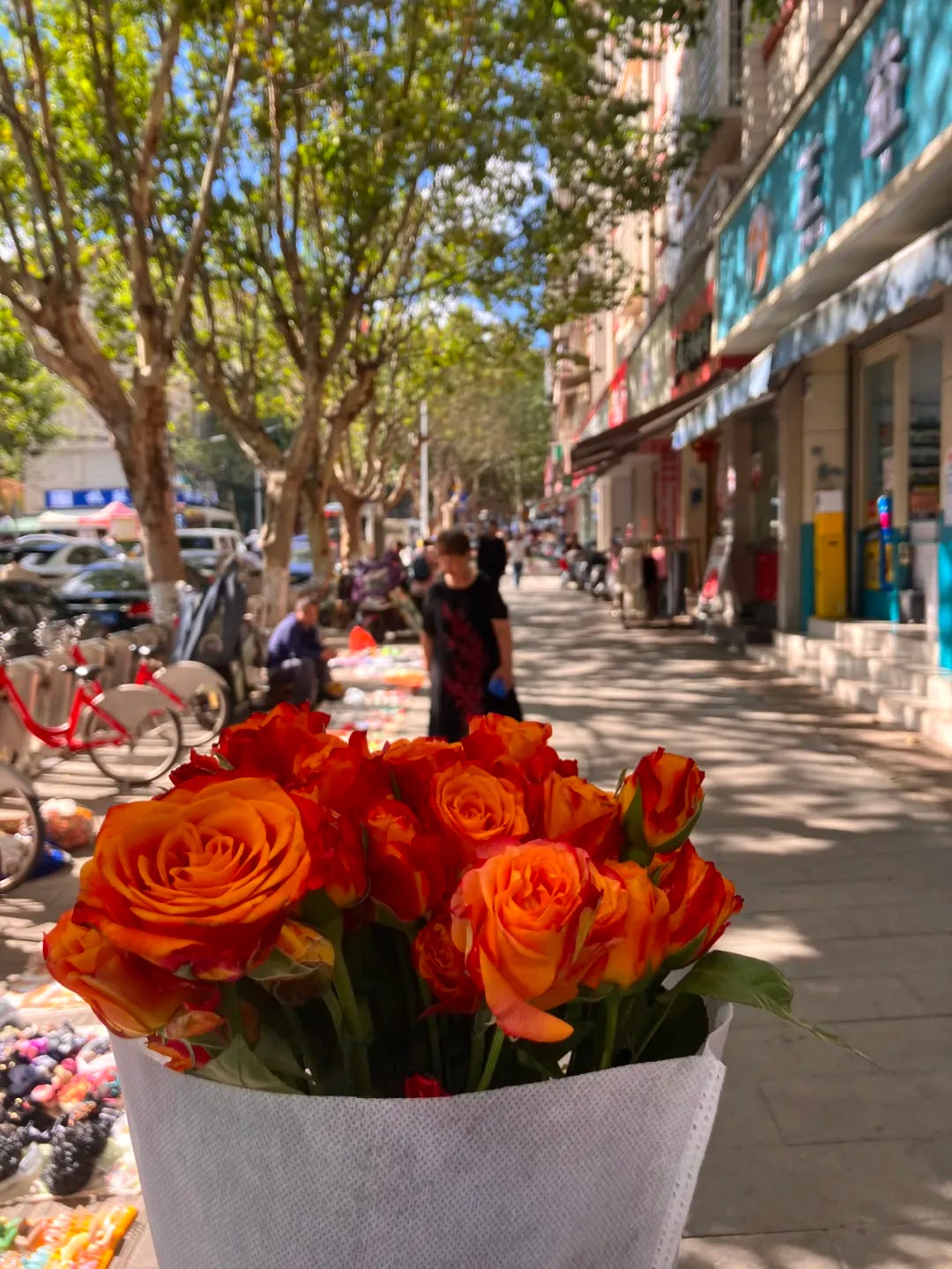
For those used to the relentless pace of first-tier cities, adapting to Kunming’s relaxed, low-pressure lifestyle is a process that takes time.
Take Wang Chaoyue, a former lawyer who moved to Kunming in early 2022. After a period of doing nothing, he felt restless and decided to start something new. He spent RMB 16,000 on a barista course, hoping to open a café. However, realizing that a coffee shop might not be very profitable, he took over a braised pork bun shop instead, branding it as "One Coffee, One Bun"—the bun symbolizing reality and the coffee representing dreams, each supporting the other.
During his first six months, Wang was the most industrious person on the street. While other shops opened around 8 a.m., he started at 6:30 a.m. and worked straight through to midnight. Even his dog couldn’t keep up, often dozing off on a camping chair. It was just him and his dog for half a year until he, too, couldn't take it anymore and adopted the same schedule as the other shops.
Later, Wang hired employees and tried various strategies to boost their motivation—offering raises, handing out titles like "store manager," and the like. None of it worked. One young woman, reliable and diligent, had been with the store for nearly three years. She never caused any trouble but steadfastly refused to work more than six hours a day, no matter the incentives. "She lives at home and is perfectly content earning just over RMB 2,000 a month," Wang remarked.
Su Qing, after joining a law firm in Kunming, hired an employee at a monthly salary of RMB 8,000, only to lament that the work delivered was worth no more than RMB 3,000. "Overtime is virtually unheard of here," she noted. Offices shut down by 6:30 p.m., and on Fridays, even earlier. Wang Chaoyue recalled a similar experience during a 2016 project in Kunming when he was amazed to see local lawyers leave work by 6 p.m. "So early? Aren’t there evening meetings to attend?" he asked, only to be met with indifference.
Yet, despite the unhurried pace, both Su Qing and Wang found themselves moved by Kunming’s residents—their warmth, sincerity, and unpretentious way of life. Here, they felt a profound sense of healing.
Once worn out by the relentless demands of her job in Beijing, Su Qing discovered a more balanced and leisurely life in Kunming. She now has ample free time to spend with her children, visit parks, and attend gatherings with friends. For the first time, she felt she had found what she called "real life." Winters, which she used to dread in Beijing for keeping her confined indoors, have taken on a new charm. Her parents, who had come from her hometown to help with childcare, no longer feel cooped up either. In Kunming, they relish stepping outside—whether it’s playing in the mud and catching fish with the kids or enthusiastically feeding seagulls by Dianchi Lake every day.
Wang, meanwhile, completely rebuilt his life in Kunming. He met his wife during a barista training course, tied the knot this year, and formed the majority of his social circle through connections made at his shop.
At his housewarming party, I met his social circle—lawyers, freelancers, drone entrepreneurs, elementary school teachers, TikTok influencers, young chefs, and local college students born in the 2000s. Despite their diverse backgrounds, the atmosphere was relaxed and harmonious. They chatted, barbecued, strummed guitars, and sang in the sunny courtyard. The scene reminded me of Dali a decade ago, where people of all ages and professions gathered around street stalls to share an evening of laughter and connection—a magic that seems to happen only in Yunnan.
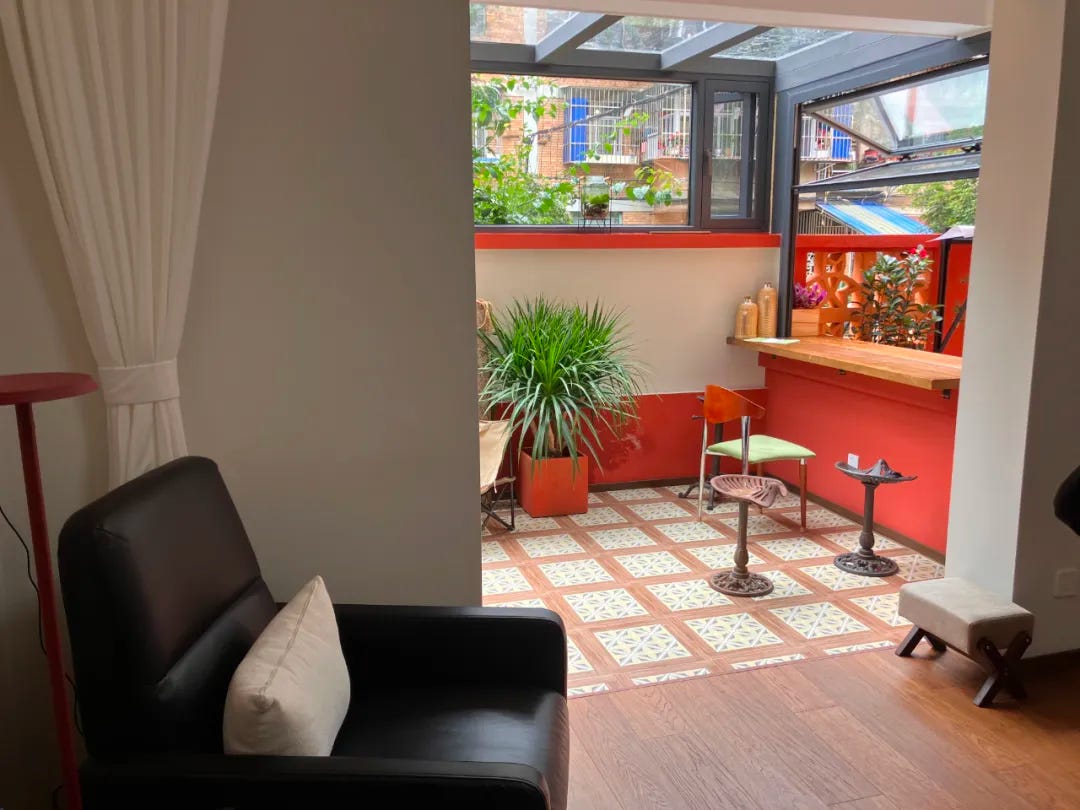
Social realities shape people’s values
For over a decade, the narrative of "escaping Beijing, Shanghai, and Guangzhou" has resurfaced time and again. In an era of faster economic rhythms, this escape was often a rebellion against relentless competition, a choice rooted in idealism. Back then, Dali, with its dreamlike allure and vibrant spirit, became the emblem of such stories. In recent years, as the pace of life has eased, the reasons for escape have shifted toward simpler, more pragmatic goals. Today, Kunming, with its grounded and everyday charm, has become the second stage for many seeking a new lifestyle.
I’m reminded of a remark by Zheng Xiaohong, a parent from Dali: ‘Social realities shape people’s values.’ The changes in recent years have led to even deeper and more fundamental shifts in perspective.
Take Gao Wanguan and his wife as an example. In Kunming, they rely on their RMB 200,000 savings to live a life of deliberate simplicity, planning to reassess their situation after two years. So far, 17 months in, their lives remain peaceful, and they are content to leave worries about the next 7 months for later.
Gao’s decision to quit his job stemmed from a tragic event: a colleague who was perfectly healthy in the morning suddenly passed away in the office. The incident shook him deeply, leaving him hyperaware of his own heart rate and imagining a similar fate.
The idea of resigning had crossed his mind countless times during late-night overtime sessions, moments of burnout from juggling seven projects at once, and days spent in a cramped, windowless cubicle.
The pandemic only reinforced this introspection, slowing life’s pace and prompting the question: "Do you really want to live like this forever?" For Gao, the answer became increasingly clear: No. Life is too unpredictable; it’s time to live the way he truly wanted.
On a winter night in late 2021, he and his wife made the decision to quit their jobs and embrace a simpler life. Over the next 18 months, they carefully prepared, choosing Kunming as their destination, saving money, and budgeting RMB 100,000 per year for living expenses.
By August 2023, with their resignations finalized, Gao’s wife arrived in Kunming two days ahead of him and found an apartment within half a day. Back home, Gao packed up 188 kilograms of belongings, arranged shipping, and boarded a train with just a backpack and their cat, officially beginning their new chapter.
Since moving to Kunming, the couple has found joy in the simplest routines: shopping at local markets, cooking meals (Gao proudly handles 70% of the cooking), and strolling through parks. Gao refers to himself as a "cooking enthusiast," as well as a "regular park-goer," "cloud collector," and "deputy director of the Kunming Lying Flat Research Center, Chenggong Branch."

For them, park visits are a serious activity. Apart from rainy days, they’ve spent almost every day of the past year and a half wandering through Kunming’s parks—walking, admiring the trees and clouds, watching sunsets, and reading. Gao shared on social media that his wife quit her job to enjoy the sun, no longer wanting to be confined to a cubicle all day. Here in Kunming, her dream has come true and then some—she can now spend entire afternoons lazily reclining on a park bench.
When I shared my impressions of their lifestyle online, one comment stood out: "They must not have kids—only then can you truly lie flat." It was true—they didn’t. But even for families with children, the changes brought by relocation can be profound.
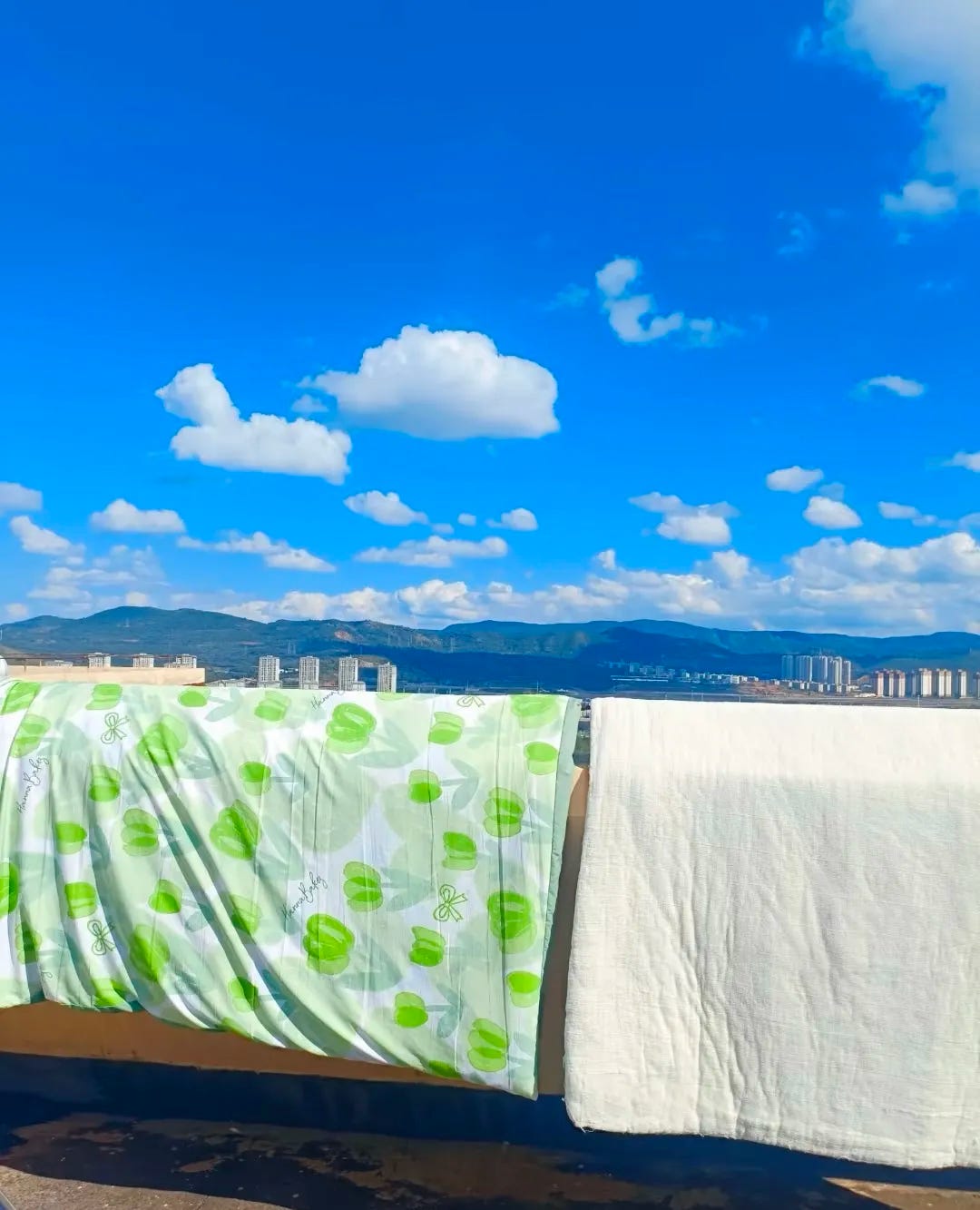
Take Su Qing, for instance. Her desire to leave Beijing had simmered for years, but the past three made it unavoidable. Economic downturns had reduced her and her husband’s income, while Beijing’s high living costs remained relentless, creating immense pressure.
What finally tipped the scales was a series of unexpected events, including the sudden closure of her son’s kindergarten, with no refund of the substantial enrollment fee. In June this year, after attending her graduate school commencement, Su packed her belongings and flew to Kunming with her parents and three children.
In Kunming, her income is lower than it was in Beijing, but so are her costs, making the transition manageable. For many families from first-tier cities, education is often the most challenging aspect of relocation.
For Su Qing and her husband, both graduates of prestigious universities and working in law and finance, the prospect of Kunming’s less competitive education system was a concern. However, their mindset had shifted. "We don’t want to pressure our kids," they said. "After all, the value of a degree is diminishing." They enrolled their eldest daughter in a private school in Kunming, where annual tuition costs just over RMB 20,000—well within their budget. Their younger son, who had attended a private kindergarten in Beijing for over RMB 10,000 a month, now goes to a local kindergarten for RMB 2,000, and Su saw no significant difference. On the contrary, she was delighted by the school’s sprawling lawns and even a man-made river. Sharing photos with friends in Beijing elicited comments like, "It looks like Hogwarts!" and "Unimaginable in Beijing."
Su Qing discovered that many families like hers had also moved to Kunming for a lower-cost lifestyle. At her children’s school, she met a mother who had recently relocated from Beijing. The woman’s husband, who worked in construction, had previously bought a house in Kunming. With the industry slowing down and their child struggling with respiratory issues, they decided to move the entire family.
In an era of consumption downgrades, leaving high-cost first-tier cities for smaller, more affordable ones like Kunming has become a flexible solution for many middle-class families. Such moves allow them to maintain their quality of life while enjoying the benefits of a lower-cost environment. Kunming’s natural beauty and livable conditions even enhance their overall happiness. These families are also redefining their priorities, letting go of the need to "move upward" or push their children relentlessly. Life becomes an experience of "knowing your own limits and finding joy in them."
Parents from Dali, who had already transitioned from first-tier cities to a more unconventional lifestyle, often demonstrate greater flexibility in their values. Zheng Xiaohong, for instance, asks her daughter each year before paying tuition: "Do you want to continue at this school?" If the answer is yes, she pays. In her view, studying abroad, taking China’s college entrance exam, or even skipping college entirely are all acceptable options. "After living in Dali for so many years, I’ve seen all kinds of people. Plenty without degrees are living well."
However, you may also notice that parents themselves are the starting point for their children. Taking an unconventional path often requires a safety net—not solely financial resources, but also knowledge, connections, skills, and a deep sense of inner security.
Kunming: A balance between the moon and sixpence
Every utopia has its flipside. To outsiders, Kunming is a city of low living costs, affordable housing, and accessible education. But for locals, there’s another reality.
According to Kunming’s municipal statistics, in 2023, the average monthly salary for workers in urban non-private sectors was around RMB 10,000, while private sector workers earned an average of RMB 4,800. It’s no wonder that "landing a government job" has become a major goal for many young people in Kunming.
Yuan Changgen, an associate professor of sociology at Yunnan University, observed that discussions about young people in the region tend to highlight two extremes: either they’re obsessively competitive in their pursuit of stable government jobs, or they’re embracing various forms of "lying flat." In reality, most young people are somewhere in the middle—lost and uncertain. Yunnan’s relatively simple industrial structure offers few job opportunities for its youth, leaving many at a crossroads.
Some have also asked me: "Will people moving from first-tier cities to Kunming drive up housing and living costs like in Dali?"
The reality is more complex. Like many cities, Kunming has expanded significantly over the past two to three decades. To the south, along Dianchi Lake, the sprawling Chenggong New District was developed with university campuses, commercial zones, residential areas, and wetland parks. Traveling from the old city center near Cuihu to the southernmost part of Chenggong takes nearly 90 minutes by subway—a distance that often feels like a journey to another city.
But, like many new urban developments, Chenggong has yet to attract a proportional influx of residents. The area feels sparse and open, with wide four- or six-lane roads carrying little traffic and high vacancy rates in its residential and commercial spaces. By 2024, the softness in Kunming’s rental market became evident. Whether for me or friends searching for apartments, it was common to find properties that had been vacant for months or even a year. Landlords often had to lower rents to attract tenants. My own landlord told me that the three-bedroom apartment I rented near Cuihu had seen its rent drop steadily from RMB 3,200 five years ago to just RMB 1,800 now—the lowest it had ever been.
Falling rents, empty apartments, and difficulty finding tenants are clear signs of economic stagnation, declining populations, and shrinking incomes.
In this context, the quiet, underpopulated expanses of Kunming’s outer districts have unexpectedly become havens for those seeking to "hide in plain sight." Free from the noise of urban competition or the weight of modern labels, these spaces offer an unassuming refuge for tired souls.
That night, I walked to Cuihu Park. It was much quieter than during the day, though a few people were still walking dogs, jogging, or strolling. The dark lake shimmered faintly, its surface alive with the energy of the water beneath.
Before moving to Kunming, I had already imagined my life near Cuihu Lake. Over countless afternoons and evenings, its green willows, bamboo groves, lotus blooms, shimmering reflections, and glowing sunsets have comforted me. Just as the writer Wang Zengqi described in Reflections of Cuihu Lake: "Rushing from the bustling streets and monotonous offices, one steps into Cuihu and instantly feels lightened. The weight of life—chores, finances, frustrations—seems to dissipate."
I now know that beyond Cuihu, Kunming is home to hundreds of wetland parks, each with its own charm. In winter, flocks of red-beaked gulls migrate from Siberia to Dianchi Lake, drawing crowds of onlookers. Few cities can immerse people so deeply in both nature and life itself—a timeless philosophy that feels especially fitting for our times.
(The names Su Qing and Gao Wanguan in the article are pseudonyms.)



